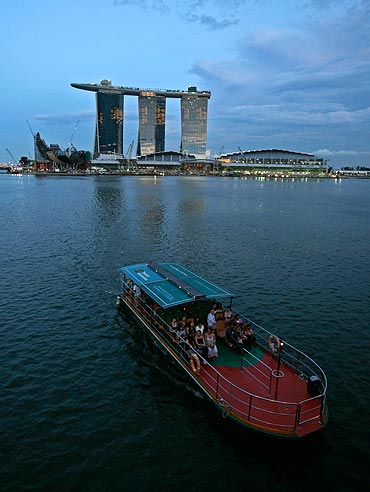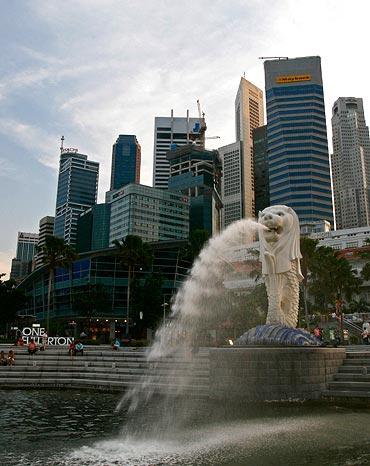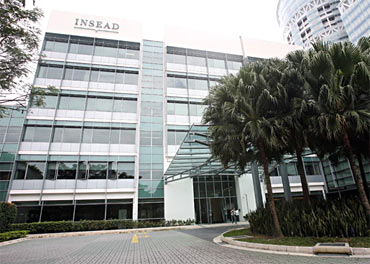 | « Back to article | Print this article |
What attracts Indian students to Singapore Universities
Of late, Singapore has emerged one of the top study destinations for our students desiring to make it big overseas, in view of stricter visa regulations imposed by some developed countries.
R.M.S. Atwal spoke to Jessica Sim, Area Director Northern and Eastern India, Singapore Tourism Board, to ascertain as to why Indian students are attracted to Singapore.
The Singapore Tourism Board works for the promotion of higher education overseas.
Excerpts from the interview:
What's special about Singapore as a study abroad destination?
Singapore has emerged as an international education hub offering a rich spectrum of courses in diverse fields. It also offers the best multicultural backdrop for the students with a safe and secure environment.
Located just a few hours flying distance from India with a culture that is global yet Asian, Singapore is home to the region's best educational institutions, offering students world-class courses that focus on creativity, innovation and entrepreneurship.
Singapore is a particularly attractive educational destination for Indian students. Its high-quality education qualifications help set students up for life, opening doors, not just in Singapore, but globally as well.
Graduates from Singapore universities are highly sought after by their respective industries. In addition, our local universities also offer joint programmes with no less than 16 leading education institutions, and over 500 study abroad programmes with top tier universities around the world, which provides a global outlook to Indian students.
R.M.S. Atwal can be reached at rajatwal55@yahoo.com
What attracts Indian students to Singapore Universities
How would you compare the education system in Singapore with that of the developed world?
Singapore is fast becoming the most preferred destination among Asian students owing to its:
1. World-class education
Singapore ensures a comprehensive education environment from high quality private education institutions to an internationally recognised public school system and top ranked universities.
The three local universities, National University of Singapore (NUS), Nanyang Technological University (NTU), Singapore Management University (SMU) rank among Asia's best and are among the leading universities of the world.
Some world-class institutions that have either set up centres in collaboration with the three universities or have campus operations in Singapore include NYU Tisch School of the Arts, Cornell University, S.P. Jain Centre of Management and the University Of Chicago Booth Graduate School Of Business among many others.
2. Wide range of educational opportunities
One of the main attractions of education in Singapore would be the wide variety of options in almost any field of study available for prospective students. Every student has an opportunity to follow her or his passion whether in the academic fields, sports or the arts.
Furthermore in its bid to be industry-relevant, Singapore also offers a myriad of specialty courses, example tourism and hospitality, arts and design, etc, which will prepare students for their future careers and enable students to contribute to the growing needs of the global economy.
3. Affordable quality education
School and tuition fees in Singapore have remained competitive and the cost of living in Singapore is still significantly lower than that of many developed countries.
Singapore's vast range of educational options provides world-class education at affordable costs. For students studying at leading foreign universities in Singapore (such as INSEAD, University of Nevada, Las Vegas' (UNLV) William F. Harrah College of Hotel Administration and S.P. Jain Centre of Management), although tuition fees may be comparable to those of the main campuses, the lower cost of living here, the proximity to home, in addition to the internationally welcoming environment, makes it a more affordable alternative to Western countries.
4. Industry-relevant education
Singapore's education institutions maintain strong links with industry to ensure that courses stay industry-relevant and dynamic, with a curriculum that reflects industry shifts and changes. The opportunities for industry attachments also give students a head- start in their future careers.
5. Connect with the world
With more than 7,000 multinational corporations (MNCs) alongside 100,000 small and medium enterprises (SMEs) having set up their base in Singapore, students can look forward to an excellent professional networking as well as job opportunities in one of the best business environments in Asia.
6. Proximity to India
Strategically located in the heart of Asia, Singapore is only around four hours away from India. The cultural similarities and geographical proximity help Indian students to easily adjust into their new environment. Indian students find Singapore to be a home-away-from home in all aspects amidst Singapore's safe, clean and green environment.
What attracts Indian students to Singapore Universities
What about English proficiency, IELTS bands requirement etc?
TOEFL/IELTS scores are not mandatory for Indian students seeking admission in Singapore but some institutes insist on TOEFL/IELTS depending on the courses applied to. Students are encouraged to check with the institution that they are applying to for any specific entry requirements for the programme.
How easy or difficult is to get study visa for Singapore?
To apply for a visa a student must first be offered a full-time course in an approved education institution in Singapore and accepted the offer for admission. Once he has been accepted into the approved educational institution, he is eligible to make an application for a student visa. For more information, students can check out the Immigration & Checkpoints Authority website at www.ica.gov.sg
There is a non-refundable visa processing fee of S$30 and a S$60 issuance fee for the student pass. For more information, students can check out the Immigration & Checkpoints Authority website at www.ica.gov.sg.
Does that country encourage permanent settlement by overseas students?
Students who have successfully completed their studies from Singapore schools/institutions and wish to work in Singapore should apply for appropriate work passes. Each application will be accessed on its merits, subject to the prevailing work pass criteria and approval by the Controller of Work Passes. To find out information about applying for permanent residency in Singapore, please check out the Immigrations & Checkpoint Authority website at www.ica.gov.sg.
What attracts Indian students to Singapore Universities
What about the cost of living in Singapore? Is it affordable to study there?
The cost of living in Singapore is slightly lower on an average in comparison to other Western countries. For international students who intend to seek admission for public institutions, the Ministry of Education (MOE) provides tuition grants to qualified international students who are enrolled at local universities and polytechnics on condition that they work in Singapore for a minimum of three years upon graduation.
Under the Tuition Grant Scheme, fees payable by international students in the local universities currently account for about 25% of total costs on average. In polytechnics, fees account for about 15% of costs on average. Currently, the Tuition Grant provides around $22,400 for a lab-based undergraduate programme, $19,000 for a non-lab-based programme in the university, and $13,300 for a diploma programme in the polytechnics. International students who take up the tuition grant are required to work for three years upon graduation, either in Singapore or overseas with a Singapore-registered institution.
What if a student does not find a good job in Singapore on study completion? Can he find better career options in other countries like the US, U K or Canada?
With over 7,000 multinational corporations (MNCs) alongside 100,000 small and medium enterprises (SMEs) having set up their base in Singapore, students can look forward to excellent professional networking and job opportunities in one of the best business environments in Asia.
How do you see Singapore five years from now as a study destination and the country as a whole?
The Singapore education landscape will continue to expand in terms of increased high quality programme offerings to cater to different student interests. Many of the public and private education institutions in Singapore constantly upgrade their curriculum and infrastructure to ensure that students are provided with an education that meets the requirements of the dynamic changes in the industry which is a huge draw for students who are equipped with the necessary skills to work in a globalised environment.
Any word of advice for our students waiting in the wings to fly to Singapore?
The Singapore Tourism Board has appointed 'Singapore Education Specialists' (SES) in major cities like Delhi, Mumbai, Bangalore, Punjab, Chennai etc. These Education Specialists are education counsellors who have undergone a training programme conducted by the Singapore Tourism Board.
These counsellors are bound by an agreed Code of Practice, which includes channeling students only to institutions supported by STB (all public institutions, including privately funded schools, foreign system schools, specialty schools and Institutes of Higher Learning brought in by the Economic Development Board, and private schools which have attained EduTrust certification).
They are trained to provide accurate and relevant information about course options, visa applications and other student matters to international students intending to study in Singapore. For more details of the SES, please visit www.singaporeedu.gov.sg.
A student's education is the key to his/her future. As such, it is important for the student to invest time and effort to make sure that he/she ends up with a good quality education that will help them advance in their career in future. Before signing up with a private school, it is important that they ensure that the institution is certified with Edu-Trust Certification. The EduTrust certification is one of the pre-requisites for private education institutions to enroll international students. To find more details related to the EduTrust-certified institutions, please visit www.cpe.gov.sg



